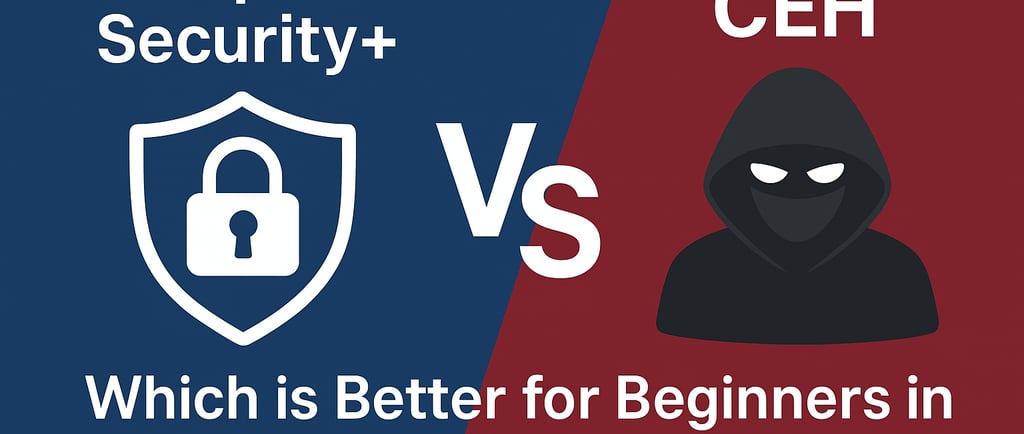CompTIA Security+ vs CEH: Which is Better for Beginners in Cybersecurity? (2025 Guide)


Introduction to Cybersecurity Certifications
In today's digital landscape, the demand for cybersecurity professionals has surged dramatically, underscoring the essential nature of cybersecurity certifications for beginners entering this field. These certifications not only serve as a testament to an individual's knowledge and skills but also play a crucial role in improving job prospects. Employers often seek candidates who possess recognized certifications, as these validate the applicant's expertise and commitment to maintaining security standards within their organizations.
If you are planning to start your career in cybersecurity, check out our training programs:
Cybersecurity certifications, such as CompTIA Security+ and Certified Ethical Hacker (CEH), are structured to equip newcomers with fundamental knowledge and practical skills necessary in addressing real-world security challenges. By obtaining these qualifications, candidates can gain a competitive edge in the job market, distinguishing themselves from other applicants who may lack formal recognition of their competencies. Furthermore, these certifications often cover essential areas—network security, threat management, and ethical hacking techniques—providing a comprehensive foundation for a career in cybersecurity.
CompTIA Security+ is commonly regarded as an entry-level certification that addresses core principles in cybersecurity and is widely respected by employers. It serves as an excellent starting point for beginners before moving on to more specialized certifications. On the other hand, Certified Ethical Hacker (CEH) delves deeper into the mindset and methodologies of hackers, enabling candidates to think like a hacker to protect against breaches effectively. Understanding the differences between these two certifications is crucial for newcomers, as it can significantly influence their career trajectories and readiness for various roles in the cybersecurity sector.
As the cybersecurity landscape continues to evolve with emerging threats, possessing a certification can accelerate career advancement and encourage continual learning and professional growth. In the subsequent sections, we will conduct a detailed comparison of CompTIA Security+ and CEH, helping beginners make informed decisions about their educational paths in cybersecurity.
Overview of CompTIA Security+
Level: Entry-level certification
Focus: Core cybersecurity fundamentals — network security, risk management, cryptography, identity, and access management.
Audience: Beginners with little to no prior experience in cybersecurity.
Global Recognition: Highly recognized in the U.S., Europe, and Middle East, especially for government & compliance jobs.
Best for fresh graduates, IT professionals shifting to cybersecurity, and complete beginners.
Overview of Certified Ethical Hacker (CEH)
Level: Intermediate certification
Focus: Offensive security — penetration testing, attack vectors, hacking tools, and exploitation techniques.
Audience: Professionals who already have a basic understanding of networking/security.
Global Recognition: Popular worldwide among companies looking for ethical hackers and penetration testers.
Best for those who want to specialize in ethical hacking and penetration testing.
Comparison of Exam Difficulty and Preparation
The CompTIA Security+ and CEH (Certified Ethical Hacker) certifications represent significant milestones for beginners in the cybersecurity field. However, their exam difficulties and preparation requirements differ considerably. Security+ is often viewed as an entry-level certification, focusing on foundational cybersecurity concepts. With an average pass rate hovering around 86%, many candidates find its content accessible, especially when paired with comprehensive study resources.
In contrast, the CEH exam is considered more advanced, emphasizing skills required for ethical hacking and penetration testing. The average pass rate for CEH exams is approximately 65%, contributing to the perception of increased difficulty. This is largely due to the specialized knowledge in hacking techniques and tools that candidates must master. As such, individuals who aspire to achieve CEH certification often require more extensive preparation time and effort.
When evaluating the preparation process for both certifications, various resources available can aid candidates effectively. For CompTIA Security+, candidates can benefit from books like “CompTIA Security+ Study Guide” and online platforms such as Udemy or Coursera, which offer structured courses tailored to this certification. Additionally, engaging with study groups on forums or local communities can further fortify learning outcomes.
For those pursuing CEH, resources are somewhat more specialized. Candidates often turn to “CEH Certified Ethical Hacker All-in-One Exam Guide” and other dedicated texts, followed by interactive online labs offered by sites like Cybrary or EC-Council’s training portal. While self-study can be beneficial, participation in formal training classes is frequently recommended due to the exam’s complexity.
In summary, while both certifications serve critical purposes in a cybersecurity career path, they cater to different levels of expertise and require distinct preparation strategies. Understanding these differences can help candidates make informed decisions that align with their professional goals.
Cost Analysis of Both Certifications
When considering the financial implications of cybersecurity certifications, both CompTIA Security+ and the Certified Ethical Hacker (CEH) demand different levels of investment. Understanding the true costs associated with each helps beginners plan their career path more effectively.
The CompTIA Security+ certification is generally more affordable as an entry-level option. The exam itself currently costs around $425. Candidates should also budget for study resources, such as books, practice tests, or online courses, which can range from $100 to $550 depending on the format and quality. For those who prefer structured learning, instructor-led training programs are available, typically priced between $1,000 and $2,500. Altogether, an individual’s total expenditure may fall anywhere between $525 on the low end (self-study only) to nearly $3,000 if formal training and additional resources are included. Since Security+ certification is valid for three years, professionals also need to account for continuing education units and renewal fees to maintain their credential.
On the other hand, the Certified Ethical Hacker (CEH) involves a higher financial commitment. The base exam voucher costs approximately $950, while candidates who pursue the self-study route through EC-Council must pay an additional $100 application fee, raising the total to $1,050. For those who prefer official training, EC-Council’s accredited courses cost around $1,899 for online instructor-led training, which includes the exam voucher, or up to $2,999 for live training. In some cases, the overall cost of CEH training programs can easily exceed $3,500. Retake fees also vary: self-study candidates pay about $499 for each retake, while those who purchase official training packages may only pay a $100 administrative fee. Like Security+, the CEH certification is valid for three years and requires ongoing professional education to remain active.
In summary, CompTIA Security+ offers a relatively lower-cost pathway into the cybersecurity field, making it ideal for beginners seeking entry-level security roles. CEH, by contrast, represents a more significant financial investment but provides specialized ethical hacking expertise that can open doors to penetration testing and red-team roles. The decision between the two ultimately depends on budget, career goals, and the type of skills an individual wants to develop in the cybersecurity industry.
Career Opportunities and Salary Potential
The landscape of cybersecurity is continuously evolving, resulting in a diverse array of career opportunities for individuals holding either CompTIA Security+ or Certified Ethical Hacker (CEH) certifications. Both certifications serve as valuable credentials that can significantly influence job prospects and salary potential.
CompTIA Security+ is often viewed as an entry-level certification, making it an ideal choice for beginners in the cybersecurity field. With this credential, individuals may pursue roles such as Security Administrator, Systems Administrator, and IT Support Technician. As organizations increasingly recognize the critical need for cybersecurity professionals, the demand for those certified in Security+ continues to grow. According to industry reports, the average salary for a Security+ certified professional ranges from $50,000 to $90,000 annually, depending on experience and geographical location. Moreover, individuals with this certification are well-positioned for upward mobility, as many employers prioritize Security+ holders for advanced roles.
On the other hand, the CEH certification caters to those seeking to specialize in ethical hacking and penetration testing. This advanced certification enables professionals to occupy specialized positions such as Ethical Hacker, Penetration Tester, and Information Security Analyst. The demand for ethical hackers is particularly high, given the increasing number of cyber threats faced by organizations. As a result, individuals with a CEH certification can expect an average salary that typically ranges from $70,000 to $120,000, again varying with experience, expertise, and industry. The growth potential in this area is substantial, as experienced ethical hackers often find opportunities to further increase their earning potential through continuous education and specialized skill development.
Overall, the choice between CompTIA Security+ and CEH can significantly influence one's career trajectory in cybersecurity. Depending on an individual’s career goals and interests, either certification can lead to rewarding opportunities and competitive salaries within the ever-growing field of cybersecurity.
Global Recognition and Industry Validation
The CompTIA Security+ and Certified Ethical Hacker (CEH) certifications are both highly regarded within the cybersecurity field, each possessing its own merits and global recognition. CompTIA Security+ is widely recognized as a fundamental credential for cybersecurity professionals, suitable for entry-level roles. It is endorsed by various organizations worldwide, including governments, thereby enhancing its acceptance across different geographical regions. This certification aligns well with industry standards such as ISO 17024 and is often recommended for individuals seeking to demonstrate foundational knowledge in security concepts, tools, and practices.
On the other hand, the CEH certification targets a more specialized area of cybersecurity, focusing on ethical hacking techniques. It equips candidates with skills required to identify vulnerabilities and trespass systems ethically. While CEH’s recognition extends globally, it is particularly revered in roles that demand technical expertise in penetration testing and system security analysis. Employers in sectors such as finance, healthcare, and technology frequently seek certified ethical hackers for their ability to proactively safeguard organizational assets against cyber threats.
Both certifications have their place within the industry, and depending on regional and organizational preferences, one may be viewed more favorably than the other. In the United States, for example, CompTIA Security+ holds significant value among entry-level positions, while CEH is often pursued by those aiming for mid-level or advanced roles in ethical hacking. Globally, the acceptance of either certification can substantially affect career mobility, as both credentials clearly demonstrate a commitment to cybersecurity standards and expertise. Therefore, candidates must consider their career aspirations, geographical location, and desired industry alignment when choosing between these two certifications.
Conclusion: Which Certification is Right for You?
Deciding between CompTIA Security+ and Certified Ethical Hacker (CEH) certifications can be a pivotal moment for those embarking on a career in cybersecurity. Both certifications hold significant value in the industry, yet they cater to distinct audiences and skill levels. CompTIA Security+ is generally regarded as an entry-level certification, providing a broad overview of cybersecurity principles, best practices, and foundational skills. This makes it an excellent choice for beginners who seek a comprehensive introduction to the field.
On the other hand, the CEH certification delves deeper into specific hacking techniques, methodologies, and advanced knowledge. It is particularly advantageous for individuals who aspire to specialize in ethical hacking and want to understand the mindset of adversaries. Therefore, if your intention is to pursue a role that focuses on penetration testing and vulnerabilities, CEH might align better with your career aspirations.
Moreover, when evaluating which certification to pursue, it is crucial to consider personal learning styles and study preferences. If you prefer structured learning with hands-on experience, CompTIA Security+ may serve you well as it incorporates practical exercises into its curriculum. Alternatively, if you thrive in a challenging environment filled with real-world scenarios, the CEH approach may be more satisfying.
Ultimately, the right certification depends on your unique career goals, interests, and the skills that you wish to acquire. Before making a decision, take the time to reflect on what you hope to achieve within the realm of cybersecurity. To further aid in your preparation, explore the various training programs available at Techonquer, which can provide targeted support to help you succeed in whichever certification you choose.
